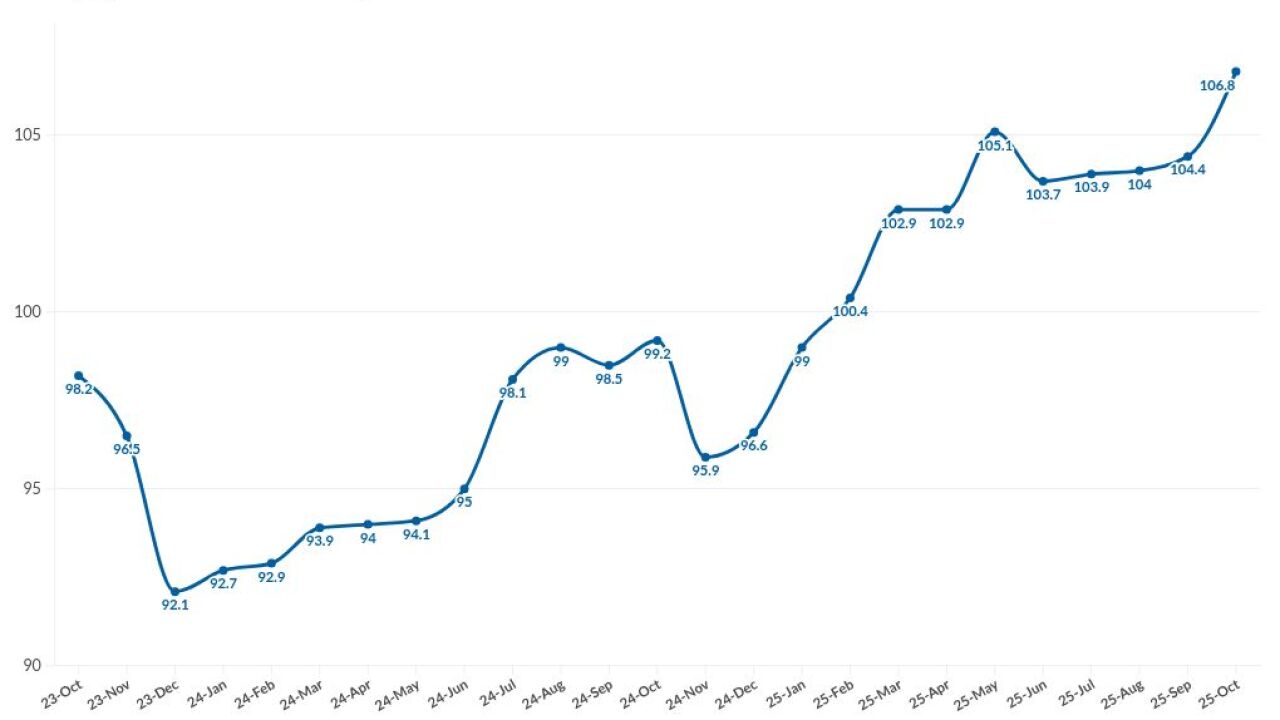Hertz Corp. is back in the rental-car securitization market, buoyed by an ongoing operational turnaround plan that includes improving returns on vehicle fleet turnover.
Through its Hertz Vehicle Financing II (HVF II) LP master trust, the company is marketing $532.4 million in asset-backed Series 2019-1 notes that will be used to finance fleets of vehicles destined for some of approximately 10,200 Hertz and Dollar Thrifty locations worldwide.
The notes are to be paid through the proceeds of lease payments, vehicle sales and refinancings of a fleet of nearly 500,000 vehicles owned by HVF II (a bankruptcy-remote, special-purpose vehicle) and leased to Hertz, the second-largest U.S. rental car company behind Enterprise Holdings.
The notes will be secured by a three-year revolving pool of new vehicles which currently average 10.6 months of age with a net book value of $597.9 million.
The 2019-1 Series sports a $384.4 million Class A notes tranche with preliminary triple-A ratings from Fitch Ratings and DBRS. The trust will also issue three subordinate tranches of notes totaling $148 million, ranging from single-A to double-B ratings.
The Class A notes are backed by a dynamic credit enhancement range of 35.77% to 40.4%, based on a unique form of CE that uses the variable collateral value of the asset vehicles, rather than being established against the face value of the notes. The CE level is in line with support levels provided in the previous 10 securitizations issued by the HVF II trust vehicle.
Fitch has estimated base-case loss expectations of 20.76% against the proposed 35.77% CE level.
Hertz has securitized fleets through the HVF II vehicle since 2013, when it created the new asset-backed platform to succeed the legacy Hertz Vehicle Financing (HVF) and Rental Car Finance (RCFC) shelfs that securitized fleets for Hertz and Dollar Thrifty Automotive Group prior to Hertz’ 2012 acquisition of its competitor.
Hertz, of Estero, Fla., acquires vehicles directly through automakers’ dedicated fleet program sales, as well as non-program vehicles. Unlike the program cars that carry manufacturer repurchase agreements to minimize the risks of vehicle value depreciation, the non-program cars are disposed through wholesale auction, dealer-direct sales and or company-owned retail sales lots.

Last year, the company sold 81% of its turnover vehicles through the alternative channels, according to DBRS, allowing it “to realize proceeds above the wholesale values typically realized at auction.”
Because of the declining volume of available program cars for fleet operators, according to the reports, Hertz now mostly builds its fleet with non-program vehicles, which are 80.1% of the collateral pool backing Series 2019-1. (Program vehicles made up as approximately 60% of pools in 2015.) For the new series, the largest concentration (24.9%) consists of Nissan-branded vehicles, all of which Hertz acquired from the automaker outside a formal fleet program.
Hertz's efforts have been aided in improving depreciation performance of sold vehicles. In 2017, an expected annualized 17.5% depreciation on Hertz’s program and non-program vehicles wound up at only 13.2% because of strong replacement demand for used cars created by the number of vehicles damaged from the Harvey and Irma hurricanes that year.
With the help of strong used-car values in 2018, the company's disposed vehicles were sold at values that were 23% in excess of the average fair market value based on Black Book USA estimates, according to Fitch Ratings.
Hertz has also been recalibrating its fleet model-makeup since mid-2016 to limit exposure to depreciation, particularly to compact cars with poor resale values. Compacts have been “notable” portions of Hertz’s fleets, but the company has shifted toward higher concentrations of SUVs and light truck, according to DBRS.
Hertz's shaping up of its fleet dynamics coincides with its multiyear operational makeover - including massive IT systems upgrades - that brought a 7% improvement in corporate revenue in the first three quarters of 2018. Net losses reduced to $137 million from $397 million in the same period a year earlier.
Hertz Corp. still carries speculative-grade ratings from DBRS, S&P Global Ratings and Moody's Investors Service.





